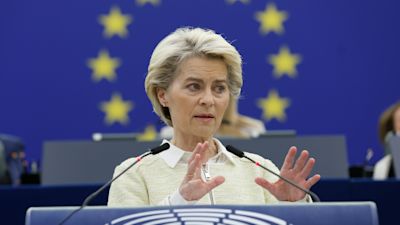EU plans to ban Russian oil by end of year in new sanctions for war in Ukraine

ITV News International Affairs Editor Rageh Omaar reports on the EU vowing to ease its dependency on Russian oil, with the bloc saying it is determined to make Putin pay a high price for his aggression
The European Union has announced it plans to ban Russian oil by the end of the year as part of a sixth package of sanctions against Moscow for its war in Ukraine.
The EU's top official, Ursula von der Leyen, told the European Parliament that member states should phase out imports of crude oil within six months, and refined products by the end of 2022.
“We will make sure that we phase out Russian oil in an orderly fashion, in a way that allows us and our partners to secure alternative supply routes and minimises the impact on global markets,” the European Commission President said.
The sanctions need to be unanimously approved before they can take effect, and it is likely to be difficult getting all 27 nations to agree, as some countries are landlocked and highly dependent on Russia for energy supplies.
Hungary and Slovakia have already said they wouldn't take part in any oil sanctions, but Ms von der Leyen didn't elaborate on whether they would receive an exemption, although this appears likely.
If approved, the ban will be the second package of EU sanctions targeting Russia’s lucrative energy industry over its invasion of Ukraine - the bloc previously approved an embargo on coal imports.
The EU has started discussions on a possible natural gas embargo, but agreement among member countries on targeting the fuel used to generate electricity and heat homes is more difficult to secure.
For expert analysis and insight on the biggest stories listen to our podcast to find out What You Need To Know
Ms von der Leyen also said that the EU should target high-ranking military officers and others “who committed war crimes in Bucha,” a suburb of the capital Kyiv.
Ukrainian officials have alleged that retreating Russian troops carried out mass killings of civilians in Bucha.
“This sends another important signal to all perpetrators of the Kremlin’s war: We know who you are. We will hold you accountable. You’re not getting away with this,” Ms von der Leyen told the parliament.
Banks are also in the EU executive arm’s sights. Ms von der Leyen proposed that Sberbank, Russia’s largest bank, and two other major banks be disconnected from the SWIFT international banking payment system.
The aim is that “we de-SWIFT Sberbank," she said. SWIFT is the major global system for financial transfers.
Ms von der Leyen said Sberbank holds around 37% of the Russian banking sector.
“And we will also de-SWIFT two other major banks in Russia. By that, we hit banks that are systemically critical to the Russian financial system and Putin’s ability to wage destruction," she said.